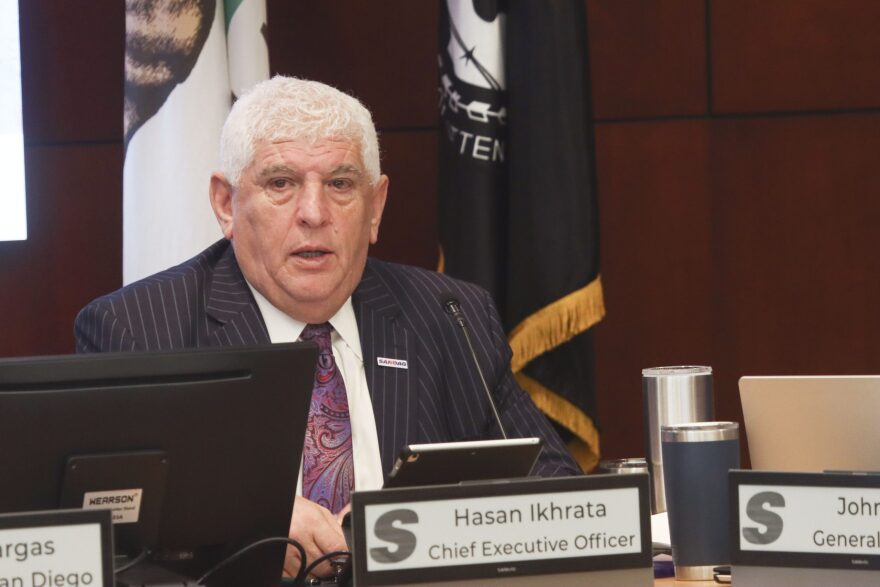The San Diego Association of Governments board this week will evaluate CEO Hasan Ikhrata’s job performance, an action it hasn’t taken for nearly two years even as internal audits have flagged major agency problems under his watch.
Ikhrata has headed the $1 billion regional planning agency since December 2018. In that time, he’s only been formally reviewed twice, despite his contract stating the board would conduct an evaluation on an annual basis.
His last review was in July 2021, when he was evaluated as exceeding expectations and he even declined a bonus. But despite a series of reports from SANDAG’s Office of the Independent Performance Auditor that found poor policies — and Ikhrata’s own questionable credit card spending — board leaders previously denied a request to review him late last year.
Now, the board will take up his evaluation as Ikhrata argues that he has “fulfilled the Board’s expectations” for his role.
Under his contract, the board has the discretion to award a pay raise or a performance bonus that amounts to as much as 7% of his roughly $414,000 base salary.
The agency’s Executive Committee has not made any recommendations on Ikhrata’s pay or performance goals, and instead voted to hold a closed session Friday with the full board. Members will determine whether his performance has been unsatisfactory, satisfactory or if it exceeded expectations.
Citing accomplishments such as the Blue Line trolley extension to UC San Diego, progress on a new border crossing in Otay Mesa, and studying of a “Central Mobility Hub” transportation center that connects to the airport, Ikhrata said “SANDAG is positioned to leverage all funding sources to deliver key projects and programs for the San Diego region.”
“I am committed to strengthening key collaborative working relationships that yield successful outcomes,” Ikhrata wrote in his letter to the board, “such as funding to ensure safety of the Del Mar Bluffs to connecting the border region to job centers to ensuring that current infrastructure such as the State Route 78 corridor works efficiently and moves people and goods effectively.”
Ikhrata received both criticism and support from public commenters last week as the Executive Committee held its first discussion on his review. Residents applauded the CEO for his efforts to expand public transit and respond to the climate crisis, while others criticized his involvement in audit findings.
Rebecca Jones, the San Marcos mayor who sits on the Executive Committee, also took issue with Ikhrata’s performance, saying that he has engaged in “insubordinate behavior” and treated some board members poorly.
“There are some serious flaws with the behavior of our director that I would like to address within our closed session,” Jones said.
Since Independent Performance Auditor Mary Khoshmashrab joined the agency in 2019, her audits have flagged improper severance payments, millions of dollars worth of increases to vendor contracts with insufficient documentation and employee credit card misuse.
inewsource later found some of SANDAG’s highest-paid staff made it a regular practice to hold business meetings at fine-dining spots with bills topping out at more than $100 per visit. Ikhrata was one of the agency’s most frequent spenders at restaurants, charging $17,000 in meals over roughly two years — and in some months, buying meals with an agency credit card more than a dozen times.
An outside government ethics expert described the spending as a “clear abuse” of public money.
New policies have clamped down on the agency’s spending, though Ikhrata remains the sole employee permitted to charge business meals on his credit card. CFO André Douzdjian told inewsource that staff next month will provide the board required reports on meal charges and credit card transactions, the first time since the board passed the policy changes.
While those reports are supposed to be submitted on a quarterly basis, software improvements and employee training have delayed the process. Douzdjian said staff continue to monitor charges and ensure rules are being followed, and that some transactions have been flagged when they’ve been deemed to be out of compliance with policy.
“We’re absolutely trying to do the best that we can,” he said. “And we are thankful to (independent auditor) that came up with these policies. I think they were good in the long run. They'll make us a better agency, and we're doing our best to adhere to them.”







